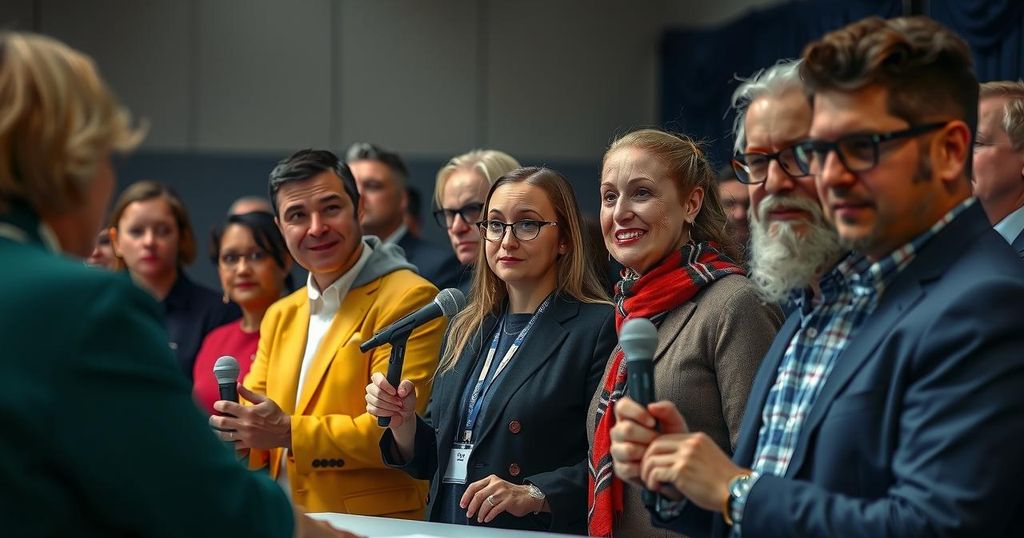Muslim Americans Embrace Third-Party Candidates in Presidential Elections

A notable number of Muslim Americans are choosing to vote for third-party candidates in the upcoming presidential elections, driven by dissatisfaction with the Democratic and Republican parties. As concerns mount over foreign policy, particularly regarding Israel’s actions in Gaza, voters like Saad Husain and Javeria Farooqi express their intent to support candidates such as Jill Stein from the Green Party. This trend underscores a search for political representation beyond the traditional two-party system, potentially impacting election outcomes in swing states where Muslim Americans are concentrated.
As the 2024 US presidential elections approach, a notable segment of Muslim American voters is expressing their intention to vote for third-party candidates instead of the Democratic or Republican nominees. One such voter, Saad Husain from Michigan, articulated his deepening disenchantment with mainstream political options, having previously voted for Democratic candidates as a means of countering what he perceived as the dangers of a Trump administration. With President Biden’s administration sending unprecedented military aid to Israel amid ongoing violence in Gaza, Husain now feels compelled to support Jill Stein of the Green Party, breaking a three-decade pattern of voting for Democrats. He warns that his third-party vote is viewed by some within the Democratic Party as a potential aid to a Trump resurgence in swing states but emphasizes that he believes it is essential to support a candidate who aligns with his values rather than simply the “lesser of two evils.” This perspective is echoed by other Muslim Americans across several critical swing states such as Florida, Pennsylvania, and North Carolina. Voters like Javeria Farooqi and Nazia Kazi have communicated that their principled refusal to support candidates whom they deem culpable for injustices—especially concerning Palestine—motivates their choice to vote third-party. Kazi noted the hypocrisy in the Democratic Party’s warnings about Trump while simultaneously supporting policies that contribute to suffering abroad. The Muslim American community is becoming increasingly vocal in its condemnation of both major political parties for what they perceive as a failure to adequately address their concerns, particularly regarding foreign policy in the Middle East. Given that Muslim Americans account for approximately 3.45 million individuals in the United States, their voting choices could significantly impact electoral outcomes in crucial states. Recent polling indicates that a surprising number of Muslim voters, particularly in Michigan, are backing third-party candidates, with up to 40% favoring Stein. Community leaders have positioned third-party voting as a legitimate expression of dissent against both mainstream parties’ policies. Despite the risk involved in potentially aiding a Trump victory, many believe that nurturing third-party options is vital for genuine democratic engagement. In a political landscape increasingly dominated by concerns about potential violence from either major party, the Muslim American electorate is carving out a distinct identity through its support for third-party candidates. This shifting allegiance reflects a broader discontent with the current political establishment’s handling of both domestic and international issues affecting their community. The upcoming election promises to illuminate these divides further, with Muslim voters seeking to assert their political agency in unprecedented ways.
The article examines the evolving attitudes among Muslim American voters toward the upcoming presidential elections, highlighting a significant shift away from traditional party loyalty. Discontent with both the Democratic and Republican parties regarding their foreign policy stances, particularly concerning Israel and Palestine, has prompted many in the community to explore third-party alternatives. With the heightened scrutiny of US military aid to Israel and the ongoing humanitarian crisis in Gaza, Muslim voters are increasingly prioritizing candidates who align with their values and principles rather than simply voting to block a perceived greater evil. This trend is especially pronounced in swing states where every vote counts, making the actions of Muslim voters potentially decisive while simultaneously scrutinizing how mainstream coverage addresses their voting behavior and choices.
In conclusion, the growing inclination of Muslim Americans to support third-party candidates highlights a significant transformation in the electorate’s political landscape. This demographic is signaling a desire for alternative voices in response to policies they perceive as harmful, particularly regarding foreign affairs related to the Palestinian conflict. By pursuing this route, these voters not only seek to express their dissatisfaction with existing political options but also demand greater recognition and representation of their concerns within the broader electoral process. As the election approaches, the implications of their choices could reverberate through key battleground states, demonstrating the importance of nuanced voter engagement and advocacy for issues central to the community.
Original Source: www.middleeasteye.net







